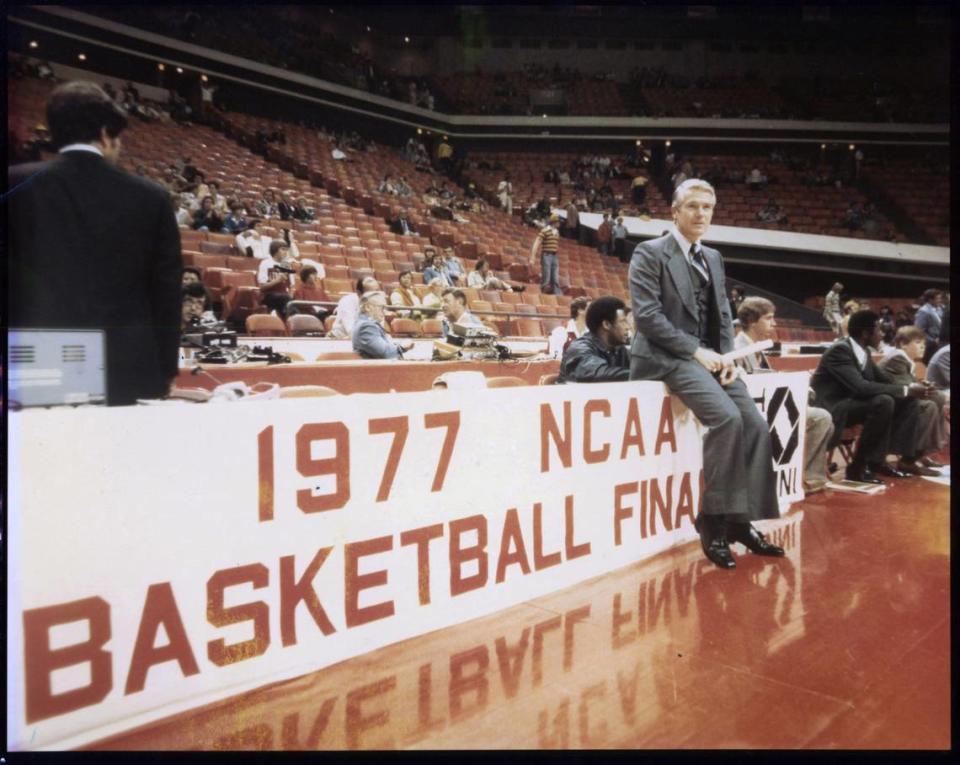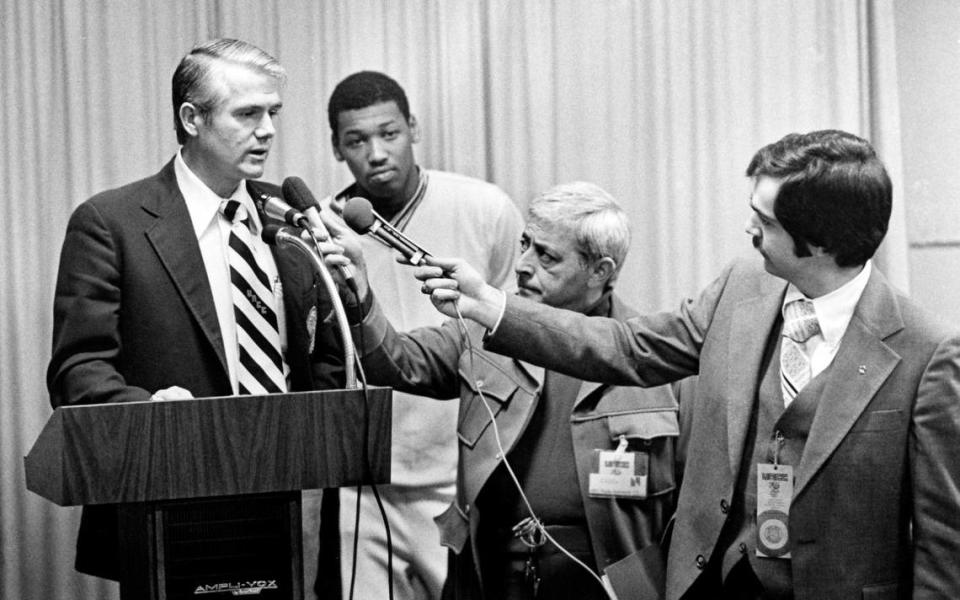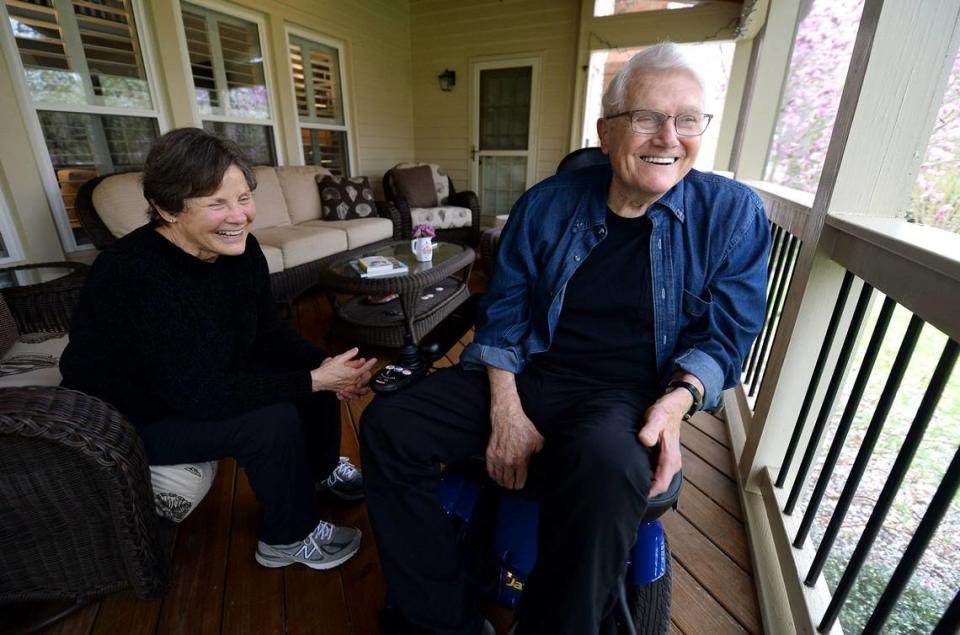He gave Charlotte its best sports moment. Now this coach faces a battle that can’t be won
- Oops!Something went wrong.Please try again later.
- Oops!Something went wrong.Please try again later.
In the midst of March Madness, The Observer recalls one of the greatest moments in Charlotte sports history.
In 1977, long before the Hornets and Panthers commanded our attention, the Charlotte 49ers reached the Final Four, in there with the giants, UNC, Marquette and UNLV, and a star whose nickname, Cornbread, reflected his small-town North Carolina roots. An end to the semifinal game that still rankles the coach who got them there. A coach whose long career in the college and NBA is distinguished by that magical run 44 years ago.
That coach was Lee Rose. Today we remember 1977 not just for us but for him, as he battles Alzheimer’s disease.
***
Lee Rose crafted a golden career. He’s one of a handful of coaches who led multiple teams to the Final Four, first with Charlotte and then Purdue in 1980.
In ‘77, he was named The Sporting News National Coach of the Year. He won 388 games in college, then moved on to the NBA as an assistant coach for four teams, including the Charlotte Hornets and Bobcats. Since retiring in 2008, he’s settled in south Charlotte with his wife of 62 years, Eleanor.
For Rose, 84, and everyone who was a part of it, nothing has ever topped what the 49ers did in ‘77, beating Michigan 75-68 to earn a berth in the Final Four in Atlanta. It was only Charlotte’s seventh season playing Division I basketball.
In the semifinal game, they lost to Marquette 51-49 when Jerome Whitehead reached over Charlotte’s Cedric “Cornbread” Maxwell, caught a length-of-the-court pass and hit a layup at the buzzer. The play shattered Charlotte’s dream to face in-state rival UNC (featuring Phil Ford and Walter Davis) in the title game, and Marquette, with Al McGuire coaching his final game, beat Dean Smith’s Tar Heels 67-59 to take the championship.

Maxwell, 65, now does radio color for the Boston Celtics, the team for which he won two NBA titles and was Finals MVP in 1981. He says he’d surrender any one of those achievements to have beaten Marquette and faced Carolina for the title. No need to watch that last play online. Just ask Maxwell. “Easily, easily that was a foul,” he says. “He hit me with his body and went over my back.”
As Maxwell continued reminiscing, he could be felt smiling over the phone as he talked about the coach who turned a kid from Kinston into a star. The players gave Rose the nickname The Silver Fox, and not just for his head of hair; he had swagger, Maxwell said. He was a motivator, and a screamer when he needed to be, like early in the Marquette game when the team wasn’t passing the ball to Maxwell. Rose called timeout, then said, “Guys, I’m going to introduce you to someone. See that guy right there (looking at Maxwell)? He’s an All-American. Get him the ball.”
Like his teammates – Lew Massey, Chad Kinch, Kevin King and others – Maxwell is aware of their former coach’s condition. “It doesn’t make me feel old,” Maxwell said. “It makes me feel sad. When I see someone like Lee, who was so sharp and so smooth…”
Today, ask The Silver Fox about 1977 and he says, “I think it’s great.”

“He’s not into that rich, rich book of memories and treasured stories,” Eleanor Rose said, so she’s happy to make up for his faded memory, reminiscing with The Observer on the day of their 62nd wedding anniversary. She and Lee celebrated together with flowers. She also filled out her March Madness brackets that day.
“What did 1977 mean to us? Fabulous. Magic. We could hardly wrap our arms around it.” She recalled the swirl of activity, the crowds cheering for them at the airport, the national attention and the semifinal loss that still evokes pride and pain.
“It was so big,” she said. “It stuck with Lee like a coat hanger on a hook. It’s etched in his mind.”
But a half dozen or so years ago, Eleanor could see that sharp mind of her husband’s fading. A man who had written two books on basketball was asking, “What do I do with Google?”
“This is not forgetting,” Eleanor said. “This is not knowing.” She saw, too, “that look” of confusion, signaling something was amiss.
Rose was diagnosed in 2015 with Alzheimer’s, the brain disorder that robs a person of his or her memory and thinking skills. It grows worse with time. There is no cure for the more than six million Americans living with Alzheimer’s. When they received the diagnosis, the first thing Rose told Eleanor is that he hated it for her. A subsequent fall in which he broke his femur and suffered spinal cord damage left Rose in a wheelchair.
Eleanor and their family — sons Mike and Mark and four grandchildren — pour out love on Lee. Eleanor rarely leaves his side, except for when professional caregivers give her the rest she needs. To ease his restlessness, she reads aloud to him. Music often plays in the home: James Taylor, Carly Simon and the like. And even after all five teams from the Carolinas were knocked out of the NCAA tournament last weekend in the first round, March Madness remains on at the Rose house, almost like background music.
Even COVID-19 has brought them a blessing: Their grandson, James, 25, is a musical actor in New York. With Broadway shut down, he moved in with his grandparents to help, and to spend time with his grandfather.
Through it all, Eleanor said her husband is the same pleasant, kind man she’s always known. He’ll start to say something, then stop when he can’t find the right words. Certain words come more easily than others, words like “equipment” and “outcome,” words he still relates to basketball. Though he knows all the grandchildren’s names, she keeps a grease board with their names and where they are living.
Though they spent a lifetime chasing victory, Eleanor understands how this battle against Alzheimer’s is going to end. “We’re not going to win this game,” she says. “We can train and rally the troops and get a good team around us, but we’re not going to win.”

***
The last word, of course, goes to The Silver Fox, the coach who ordered his team to get the ball into Cornbread that afternoon in Atlanta 44 years ago. He says having Alzheimer’s doesn’t make him mad. “I’m sitting here right now at the table where I’m having breakfast. I’m watching the birds fly and that’s interesting.”
There is one final question. Maybe he’s been asked it so many times, before and after Alzheimer’s, that he has rehearsed the answer. Or maybe The Silver Fox isn’t done yet.
Does he ever think about that Marquette game?
“You didn’t have to bring that up!”
Ken Garfield, a former assistant sports editor at The Observer and is a freelance writer for charitable causes. He also edits books and writes obituaries. Reach him at garfieldken3129@gmail.com .

